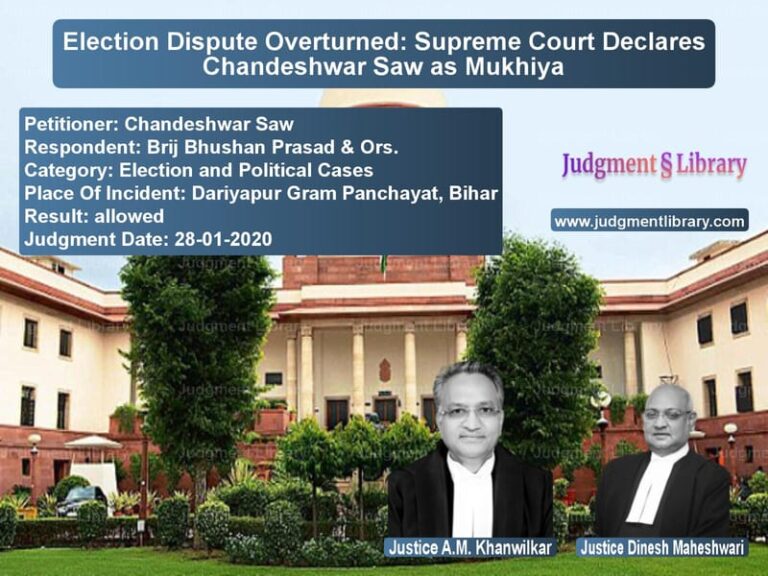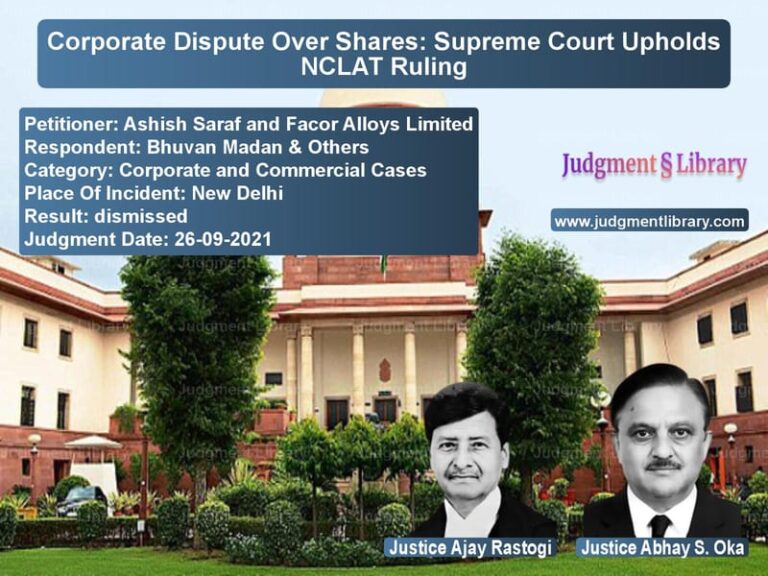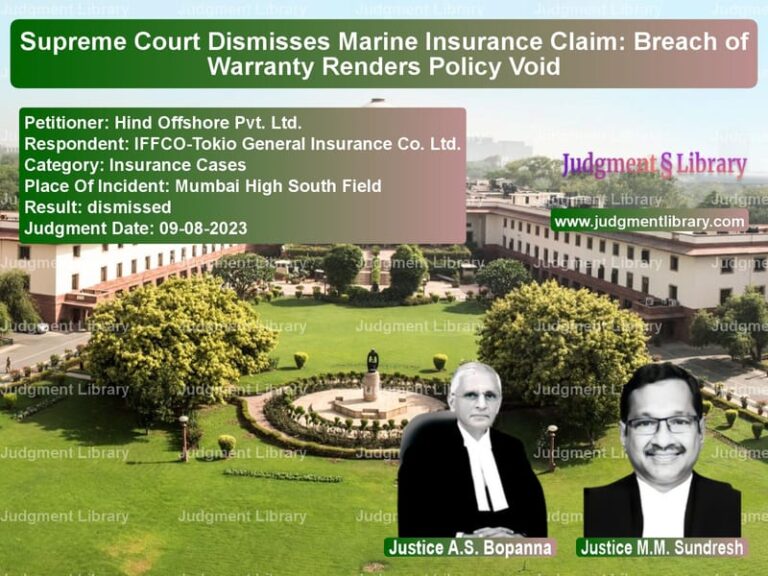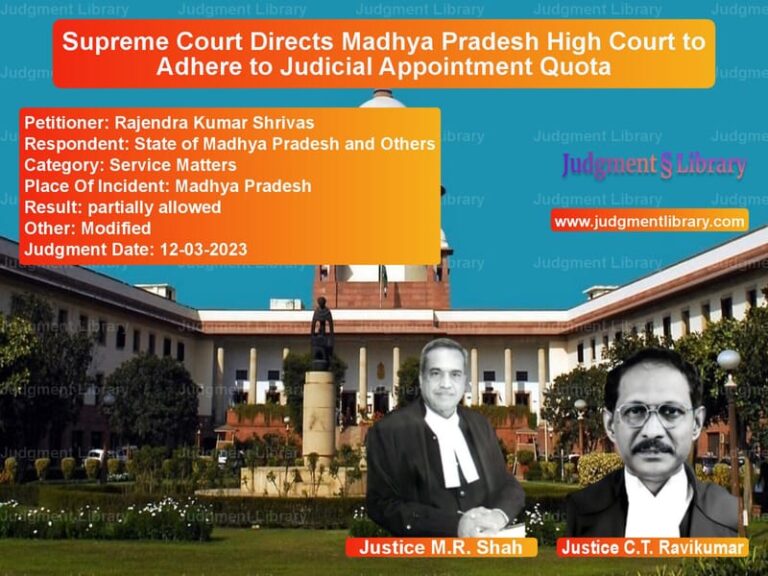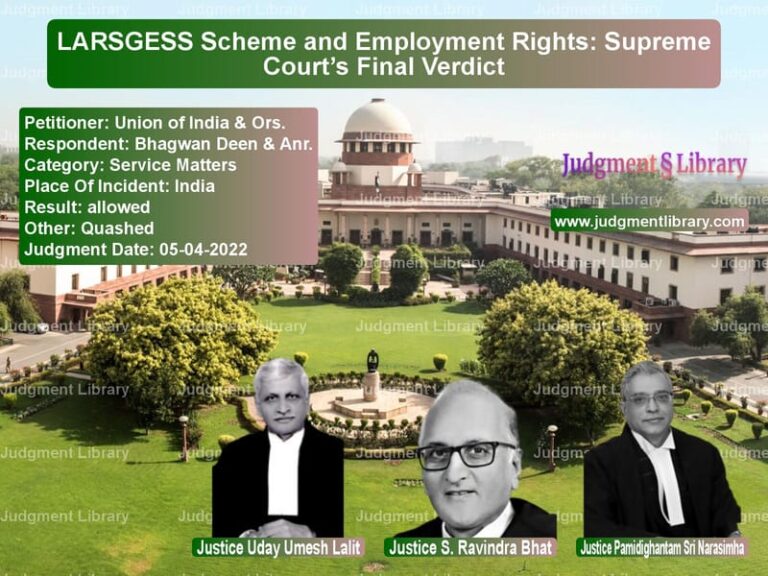Impact of Section 87 on Arbitration Awards and Insolvency Code: Supreme Court Ruling Explained
The Supreme Court of India in Hindustan Construction Company Limited & Anr. v. Union of India & Ors. addressed the constitutional validity of Section 87 of the Arbitration and Conciliation Act, 1996, inserted by the Arbitration and Conciliation (Amendment) Act, 2019. The Court also examined the repeal of Section 26 of the Arbitration and Conciliation (Amendment) Act, 2015, and its implications on arbitration awards and insolvency proceedings.
The petitioners, comprising major infrastructure companies, contended that government bodies delay payments arising from arbitral awards by filing challenges under Sections 34 and 37 of the Arbitration Act. This results in an automatic stay of the awards, which prevents the recovery of legitimate dues. At the same time, these companies face insolvency proceedings due to outstanding debts to their operational creditors, creating a double burden.
Background of the Case
The case was filed by Hindustan Construction Company Limited and others challenging the constitutional validity of Section 87. The petitioners argued that the provision reinstated the automatic stay of arbitration awards once a challenge was filed under Section 34. This nullified the amendments made in 2015, which sought to expedite the enforcement of arbitral awards by removing such automatic stays.
Additionally, the petitioners contested the retrospective repeal of Section 26 of the 2015 Amendment Act, arguing that it unfairly impacted pending arbitration proceedings and their enforcement.
Petitioners’ Arguments
The petitioners were represented by Dr. Abhishek Manu Singhvi, a Senior Advocate, who argued:
- The automatic stay provision in Section 87 contradicts international arbitration norms, particularly the UNCITRAL Model Law, which advocates minimal court intervention.
- Arbitration awards should be enforced as court decrees and should not be automatically stayed upon filing a challenge.
- The provision unfairly benefits government agencies, allowing them to delay payments indefinitely, whereas private companies are subjected to strict financial and insolvency regulations.
- The petitioners were placed in a precarious financial position where their own creditors initiated insolvency proceedings against them, despite their entitlement to large sums under arbitral awards.
Respondents’ Arguments
The respondents, represented by Attorney General K.K. Venugopal and Solicitor General Tushar Mehta, defended Section 87 on the following grounds:
- Parliament has the authority to clarify its legislative intent and remove any ambiguity in the Arbitration Act.
- Arbitration laws should not be used as a tool for debt recovery. The purpose of arbitration is to resolve disputes, not to replace traditional debt collection mechanisms.
- Government bodies such as NHAI and Public Sector Undertakings (PSUs) perform sovereign functions and should not be subjected to insolvency proceedings.
- Fixing a cutoff date for the applicability of amendments is a matter of legislative policy and cannot be struck down unless it is arbitrary.
Key Observations by the Supreme Court
- The Court held that Section 87 is unconstitutional as it reinstates an automatic stay on arbitral awards, which is against the principles of minimal judicial interference and speedy enforcement of arbitration awards.
- The retrospective repeal of Section 26 of the 2015 Amendment Act was ruled manifestly arbitrary and violative of Article 14 of the Constitution.
- The Court reaffirmed that arbitration awards should not be automatically stayed upon the filing of a challenge under Section 34.
- Government entities such as NHAI cannot be subjected to insolvency proceedings as they perform sovereign functions.
Judgment and Conclusion
The Supreme Court struck down Section 87 of the Arbitration Act and declared the repeal of Section 26 of the 2015 Amendment Act as unconstitutional. The Court emphasized that arbitration awards must be enforced without unnecessary judicial interference and delays.
Regarding the Insolvency and Bankruptcy Code, the Court held that government entities like NHAI cannot be subjected to insolvency proceedings, as they perform sovereign functions. However, the Court rejected the argument that the Code should be modified to allow claims against such entities.
This judgment has a significant impact on arbitration in India by ensuring that awards are not indefinitely stayed due to procedural challenges. It also clarifies that the Insolvency Code cannot be used as a tool to coerce payments from government agencies.
Implications of the Judgment
- Businesses and contractors dealing with government entities will benefit from faster enforcement of arbitration awards.
- The ruling prevents frivolous challenges under Section 34 from stalling the enforcement of awards.
- Government departments must adhere to arbitration awards without exploiting automatic stay provisions.
- The judgment reinforces India’s commitment to arbitration as an efficient dispute resolution mechanism.
Petitioner Name: Hindustan Construction Company Limited & Anr..Respondent Name: Union of India & Ors..Judgment By: Justice R.F. Nariman, Justice Surya Kant, Justice V. Ramasubramanian.Place Of Incident: India.Judgment Date: 27-11-2019.
Don’t miss out on the full details! Download the complete judgment in PDF format below and gain valuable insights instantly!
Download Judgment: Hindustan Constructi vs Union of India & Ors Supreme Court of India Judgment Dated 27-11-2019.pdf
Direct Downlaod Judgment: Direct downlaod this Judgment
See all petitions in Arbitration Awards
See all petitions in Dispute Resolution Mechanisms
See all petitions in Arbitration Act
See all petitions in Enforcement of Awards
See all petitions in Commercial Arbitration
See all petitions in Judgment by Rohinton Fali Nariman
See all petitions in Judgment by Surya Kant
See all petitions in Judgment by V. Ramasubramanian
See all petitions in allowed
See all petitions in supreme court of India judgments November 2019
See all petitions in 2019 judgments
See all posts in Arbitration and Alternate Dispute Resolution Category
See all allowed petitions in Arbitration and Alternate Dispute Resolution Category
See all Dismissed petitions in Arbitration and Alternate Dispute Resolution Category
See all partially allowed petitions in Arbitration and Alternate Dispute Resolution Category


